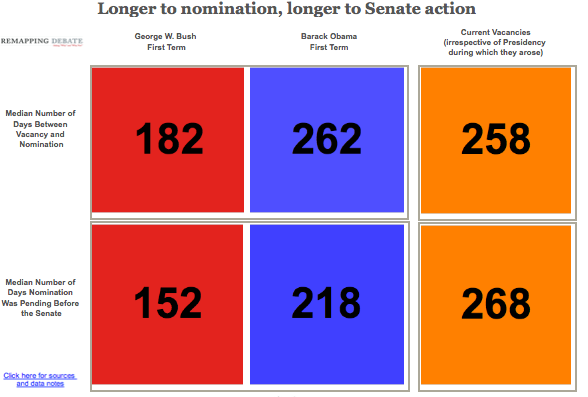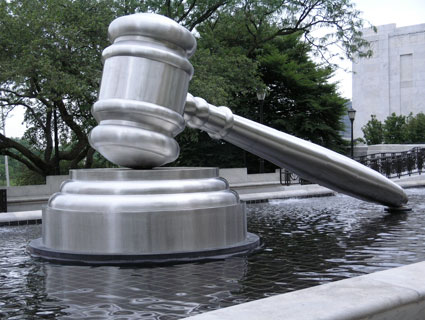Last week, President Obama withdrew his judicial nominee for the powerful DC Circuit Court of Appeals—which hasn’t had a nominee confirmed since 2006—because Republicans threatened to filibuster her. This high-profile battle is just the tip of the iceberg. Because of Republican obstructionism, the Obama administration’s lackadaisical pace of nominations, and problems with the Senate confirmation process, more federal judgeships are staying vacant nationwide under this president than under President Bush, and Obama’s nominees are taking longer to get confirmed.
During Obama’s first term, the number of appeals court vacancies rose from 14 to 17. During Bush’s first term, by contrast, appeals court vacancies dropped from 27 to 18. Because Obama has been slower to nominate than Bush or Clinton, the average number of days from the opening of a seat to a nomination increased by 44 percent between Bush’s and Obama’s first terms.
This graph, by the data visualization shop Remapping Debate, shows the average number of vacancies per year, starting in 2001 (scroll to view all years, and hover over for details):
When the president finally does nominate someone, the Senate is generally reluctant to confirm her. Obama has 15 judicial nominees waiting for Senate floor votes right now. Overall, his judicial nominees wait an average of 116 days on the Senate floor for a vote—three times longer than Bush’s average judicial nominee wait time. When the 112th Congress ended in December, the Senate had approved 175 of Obama’s judges. By contrast, Bush had 206 judges approved in his first term, and President Clinton had 204.
The figure below, also by Remapping Debate, compares Bush and Obama’s first terms, showing the average number of days between vacancy and nomination, and the number of days nominees were pending before the Senate.

Why is the GOP so obstinate on confirmations? Senate Republicans may be giving Democrats a little payback. “Republicans don’t think Bush’s nominees were treated fairly,” Russell Wheeler, a fellow at the Brookings Institution, which has tracked the phenomenon, told Bloomberg News on Wednesday.
Confirmation of a nominee to the DC circuit court, which is one step below the Supreme Court, is particularly important for Obama’s second term because the court handles all disputes related to regulations and executive actions. “With legislative priorities gridlocked in Congress, the president’s best hope for advancing his agenda is through executive action, and that runs through the D.C. Circuit,” Doug Kendall, president of the Constitutional Accountability Center, told the Washington Post Tuesday.
Right now that court is conservative-dominated, with four Republican and three Democratic appointees, and four vacancies (twice as many as any other court of appeals). This configuration didn’t work out so well in the Obama’s first term. The DC circuit court blocked EPA air pollution rules and put a hold on cases related to workers’ rights.
Of the DC circuit confirmation, Kendall says “There are few things more vital on the president’s second-term agenda.”







